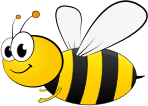
Editors Note: We welcome guest writer Karoline Gore and her first post on this website. Karoline worked for several years as a garden landscaper before taking to freelance writing. In her work as a backyard architect, her focus was on creating a flourishing environment for wildlife. As a freelance writer, she actively promotes gardening to support natural wildlife.
From the banks of the winding Shenandoah to the leafy greenery of Prince William Forest, Virginia’s countryside enjoys rich and varied ecosystems and agriculture; much of it thanks to its bees. Yet bee populations are declining across the country, with several species becoming conservation concerns. While not everyone may get the chance to rescue an individual bee by hand, it’s possible to play a role in their conservation in a variety of ways. It’s vital that people take up the challenge to ensure that Virginia’s countryside and industries can thrive for future generations.
The challenge facing Virginia’s bees
While there are some 3,500 species of native bee in North America, Virginia is home to 14 varieties. However, due to colony diseases, the use of pesticides and recent bad weather, bees have faced a decline in numbers across America and many other parts of the world. It is estimated that colonies or hives are currently declining by 30-50% over the winter, compared with 5-10% in previous years.
Keeping Virginia thriving
Bees are said to pollinate around 90% of the world’s crops, as well as being responsible for wild plant pollination, and helping forests to be more fruitful. Wild animals, birds and other insects also enjoy the food they provide. In Virginia specifically, bees’ hard work ensures that there’s plenty of pollinated clover for the state’s thriving dairy cattle industry, increased output in cotton production, and plentiful food crops from pumpkins to pears. Thankfully, the state operates fairly tight rules on the use of pesticides which are harmful to bees, but there’s always more that can be done to protect these champions of the countryside.
How you can help
In 2018, Virginia trialled a state-funded initiative to give away free bee hives to encourage bee keeping and conservation; this was enthusiastically welcomed, with the department receiving one request every minute. The initiative will return in July, so do find out more and register if you are interested. If you have any queries regarding Virginia’s beekeeping code, you can also email VDACS directly. If you don’t feel ready for a hive, you can still encourage and support bees by planting a variety of flower shapes and colors in your yard, leaving out a shallow dish of water in warmer weather, and building a small bug house or hotel for them to shelter in during cooler months.
Bees may be small but they are certainly powerful. From making important contributions to the ecosystems they inhabit, to helping the broader agricultural community, much of Virginia is able to thrive courtesy of bees. Play your part in protecting these industrious creatures, so that future families can enjoy the same benefits.